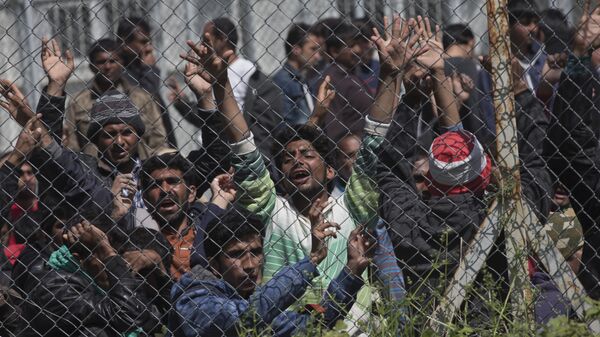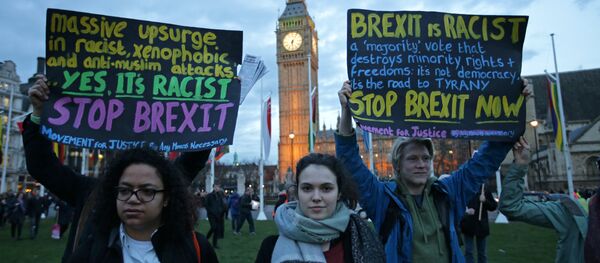PARIS (Sputnik) — French President Emmanuel Macron does not seem interested in closing down migration and stabilizing France, and seems to want to increase migration flows, alongside German Chancellor Angela Merkel, Schmidt told Sputnik.
Schmidt said that Macron's suggestion to create centers for migrants in North Africa was just an attempt to "calm down the talk about migration." In late July, Macron said France would set up processing centers in Libya, which would look into people's asylum demands without refugees having to make the dangerous crossing to Europe.
"We think that the high-ranking leaders in Europe want to bring as much migrants in the EU as possible, because on one hand, they say it for the public, they need those migrants to balance the low birth rate in Europe, and just out of the economic reasons. Just out of the economic reasons they take millions of migrants, and the EU is having a completely damaging population policy," Defense Europe spokesman said.
Schmidt pointed out that under the European Union's Dublin Regulation refugees had to apply for asylum in the first safe country they arrived in, but a large number of migrants arriving in Europe went through several countries before applying.
Catherine Wihtol de Wenden, a researcher at Paris Institute of Political Studies specializing in migration, told Sputnik that the issue of distinguishing migrants from refugees was of major importance to France.
"We said we’ll reduce the time of the status determination to six months, which is a good thing, but it’s going to prove difficult except for we throw a lot of personnel on it," de Wenden said.
According to the researcher, the problem is present on the European level as well, for example, in Greece and Italy, because the existing legal instruments, such as the Geneva convention on refugees, do not "correspond anymore to the reality of the flux."
"The only solution to get out of it is to give a status of a temporary migrant, giving protection to people who do not correspond to the refugee status on one hand, and on the other to re-open the labor market in the troubled sectors to avoid the status of false refugees," de Wenden said.
The 1951 Refugee Convention ratified by 145 state parties defines the term "refugee," sums up the rights of the displaced and the duties of the states. The UN Refugee Agency is partially responsible for the implementation of the convention and states are required to cooperate with it.
Europe has been facing an unprecedented influx of migrants and refugees, many of them fleeing economic insecurity and conflict in their countries of origin. The Dublin Regulation establishes which European state should be responsible for an asylum claim, usually the first state a refugee enters.





